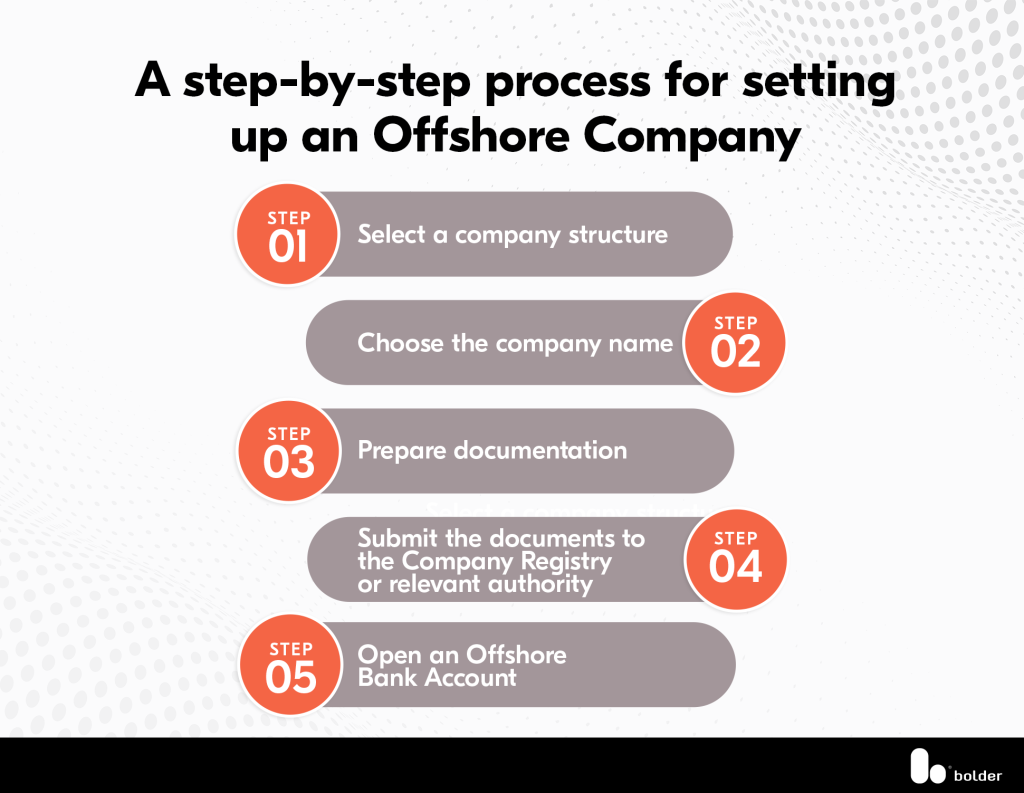Understanding Offshore Firm Formations: A Comprehensive Overview to the Refine and Advantages
Offshore company formations provide a tactical avenue for entrepreneurs looking for to maximize their company procedures. These entities frequently give benefits such as tax advantages, raised privacy, and durable property security. Understanding the ins and outs of picking a territory, the development process, and compliance demands is necessary. As the landscape of worldwide business evolves, the ramifications of developing an offshore firm warrant careful consideration. What steps should one require to browse this complex surface?
What Is an Offshore Firm?
An overseas company is a business entity incorporated outside the territory of its proprietors' home, usually in a nation with positive regulatory and tax settings. These companies can offer different functions, including possession security, worldwide trading, and riches monitoring. They are commonly developed in territories referred to as tax obligation sanctuaries, where corporate tax obligation rates are missing or reduced, and privacy laws are rigid.
Offshore companies may be had by people or other business entities and can operate in different markets, consisting of shopping, consulting, and finance. While they use specific advantages, the regulative and legal frameworks regulating offshore business differ substantially by territory. Company owners should browse these intricacies to ensure conformity with both regional and international laws. Recognizing the framework and feature of offshore business is vital for individuals considering this option for business operations or possession administration.
Advantages of Developing an Offshore Company
While the choice to form an overseas company may stem from different critical factors to consider, the potential advantages are compelling for many local business owner. One considerable advantage is tax optimization; lots of overseas jurisdictions use positive tax prices or also tax obligation exemptions, permitting firms to maintain more revenues. Additionally, overseas firms typically supply improved personal privacy defense, securing the identifications of shareholders and directors from public analysis.


Last but not least, business owners may locate functional adaptability, as overseas territories frequently have fewer regulatory difficulties, making it possible for structured management and administration. Jointly, these advantages make offshore firm formations an eye-catching choice for numerous looking for to broaden their company horizons.
Selecting the Right Territory
Selecting the suitable territory for an overseas business is an essential action in optimizing the benefits detailed earlier. Numerous variables influence this choice, including tax regulations, company regulations, and the total organization setting. Jurisdictions such as the British Virgin Islands, Cayman Islands, and Singapore are frequently favored for their beneficial tax routines and durable lawful structures.
It is vital to consider the particular requirements of business, such as personal privacy requirements and governing compliance. Furthermore, the convenience of working, including the efficiency of company registration and financial facilities, plays a considerable function.
Prospective owners need to additionally evaluate the political security and credibility of the chosen territory, as these aspects can impact lasting success. Inevitably, thorough research and professional appointment are suggested to ensure alignment with the company's objectives and to leverage the full possibility of overseas advantages.

The Offshore Firm Formation Refine
The offshore firm development process entails a collection of crucial steps that call for cautious preparation and execution. Originally, people or companies need to select an appropriate territory that straightens with their objectives, thinking about factors such as tax advantages, personal privacy, and regulatory atmosphere. Following this, the following action involves picking the proper business framework, such as an International Organization Firm (IBC) or Minimal Responsibility Firm (LLC)
As soon as the structure is figured out, needed papers, consisting of a business plan, identification, and proof of address, should be prepared. Involving a reliable local representative or provider can streamline this stage, making certain conformity with neighborhood regulations. After submitting the required documentation to the appropriate authorities, the formation process commonly finishes in the issuance of a certification of unification. This file establishes the company as a legal entity, enabling it to conduct business internationally.
Lawful Requirements and Conformity
Understanding the lawful demands and compliance commitments is necessary for any individual wanting to develop an offshore firm. Each jurisdiction has particular laws that need to be abided by, which can include firm enrollment, obtaining needed licenses, and maintaining local addresses. Offshore Company Formations. It is essential to assign a signed up agent who can facilitate interaction with regional authorities and warranty conformity with continuous coverage needs
In addition, lots of jurisdictions require the submission of yearly financial statements, along with tax filings, also if the firm does not produce income. Shareholders and directors should be identified, with due diligence procedures commonly mandated to verify their identities. Failure to meet these lawful commitments can lead to penalties or the dissolution of the firm. Consequently, possible overseas firm owners must seek advice from with attorneys experienced in worldwide business regulation to browse these intricacies efficiently and assure complete compliance with all policies.
Tax Ramifications of Offshore Firms
The tax effects of overseas firms existing considerable benefits that bring in numerous business owners. Understanding the connected conformity requirements is important for navigating the intricacies of global tax regulations. This area will certainly explore both the possible benefits and the required commitments associated with offshore company structures.
Tax Benefits Overview
Offshore firms are commonly checked out with uncertainty, they can supply considerable tax advantages for services and individuals looking for to optimize their financial strategies. Among the primary benefits is the capacity for lower business tax rates, which can cause substantial cost savings. Lots of overseas jurisdictions offer positive click here for more info tax regimes, including absolutely no or minimal tax obligation on profits, resources gains, and inheritance. Additionally, overseas companies can help with global service procedures by lowering tax liabilities related to cross-border transactions. This framework may also make it possible for tax obligation deferral opportunities, allowing revenues to expand without instant tax. Inevitably, these advantages contribute to improved economic effectiveness and property protection, making offshore firms an attractive choice for savvy capitalists and business owners.
Conformity Demands Clarified
Offshore business may offer tax advantages, but they additionally come with a collection of compliance demands that must be very carefully navigated. These entities undergo particular reporting commitments, which differ significantly relying on the jurisdiction. Usually, overseas companies must preserve precise monetary records and submit annual financial declarations to follow regional laws. Furthermore, lots of jurisdictions require the disclosure of beneficial possession to combat money laundering and tax obligation evasion. Failing to stick to these compliance measures can cause serious penalties, consisting of fines and possible loss of organization licenses. Understanding the neighborhood tax obligation laws and worldwide contracts is essential, as they can impact tax obligation responsibilities and overall functional legality. Engaging with legal and monetary specialists is advisable to assure complete conformity.
Keeping and Handling Your Offshore Firm
Maintaining and handling an offshore business includes adhering to various continuous compliance read needs necessary for legal procedure. This includes diligent monetary document keeping and an understanding of tax obligation responsibilities essential to the company's jurisdiction. Efficient monitoring not just ensures regulatory compliance but additionally supports the company's economic health and durability.
Recurring Compliance Needs
Ensuring ongoing conformity is essential for any type of entity operating in the overseas field, as failing to fulfill regulative requirements can lead to substantial fines or also dissolution of the company. Offshore business need to abide by neighborhood legislations, which may consist of annual filing of economic statements, repayment of required costs, and maintaining a licensed workplace address. Additionally, firms are typically called for to appoint a neighborhood agent or rep to assist in communication with authorities. Normal updates on modifications in regulations or tax demands are necessary for compliance. Adherence to anti-money laundering (AML) and know-your-customer (KYC) regulations is essential. By keeping organized records and staying educated, offshore companies can guarantee they stay certified and reduce threats related to non-compliance.
Financial Document Maintaining
Effective financial record keeping is necessary for the successful administration of any overseas firm. Keeping precise and thorough monetary records help in tracking the firm's efficiency, assuring conformity with neighborhood regulations, and helping with educated decision-making. Firms should execute systematic procedures for documenting income, expenses, and deals to produce openness and liability. Making use of bookkeeping software application can improve this process, enabling real-time monetary evaluation and coverage. Consistently evaluating financial statements assists recognize trends, assess productivity, and handle capital effectively. In addition, it is vital to safely keep these records to protect sensitive information and guarantee easy accessibility throughout audits or economic evaluations. By prioritizing precise monetary document maintaining, overseas business can boost operational efficiency and assistance long-lasting success.
Tax Obligations Overview
Recognizing tax obligation obligations is vital for the correct monitoring of an offshore business, as it directly influences financial efficiency and compliance. Offshore companies might go through numerous tax laws depending upon their territory, including company taxes, value-added tax obligations, and withholding taxes. It is necessary for service proprietors to remain notified about their tax duties, as failure to comply can result in fines and legal problems. In addition, lots of overseas territories use tax incentives, which can significantly benefit organizations if navigated correctly. Engaging an experienced tax consultant or accounting professional concentrating on global tax obligation legislation can help assure that business fulfill their responsibilities while enhancing their tax obligation strategies. Ultimately, persistent tax obligation management contributes to the total success and sustainability of an overseas entity.
Regularly Asked Inquiries
Can I Open Up a Savings Account for My Offshore Company From Another Location?
The ability to open up a bank account for an offshore company from another location relies on the bank's plans and the territory's policies. Numerous financial institutions provide remote services, yet details requirements may differ significantly between institutions.
What Are the Costs Associated With Creating an Offshore Company?
The prices entailed in creating an offshore firm generally include registration fees, legal and consulting costs, and continuous maintenance charges. These expenses differ substantially based upon territory, intricacy of business framework, and details solutions required.
Are There Limitations on That Can Be a Shareholder?
Restrictions on investors vary by jurisdiction. Some nations might impose restrictions based on citizenship, service, or residency type - Offshore Company Formations. It's necessary for possible financiers to research details guidelines suitable to their site chosen offshore place
For how long Does the Offshore Firm Development Refine Generally Take?
The overseas business development procedure typically takes between a few days to a number of weeks. Variables affecting the timeline consist of jurisdiction demands, document prep work, and responsiveness of appropriate authorities entailed in the registration procedure.
What Happens if I Fail to Adhere To Local Legislations?
Failing to abide by local legislations can cause severe penalties, including fines, lawsuit, or loss of service licenses - Offshore Company Formations. It may also harm the company's online reputation and prevent future business opportunities in the territory
An offshore business is an organization entity incorporated outside the jurisdiction of its owners' house, commonly in a country with desirable governing and tax settings. One considerable advantage is tax obligation optimization; several offshore jurisdictions offer favorable tax obligation prices or also tax obligation exemptions, permitting firms to keep more profits. Overseas companies are typically checked out with hesitation, they can use significant tax benefits for people and services seeking to maximize their monetary techniques. Additionally, overseas companies can facilitate worldwide service procedures by lowering tax obligation obligations connected with cross-border transactions. Offshore business may be subject to various tax obligation legislations depending on their jurisdiction, including business taxes, value-added tax obligations, and withholding tax obligations.